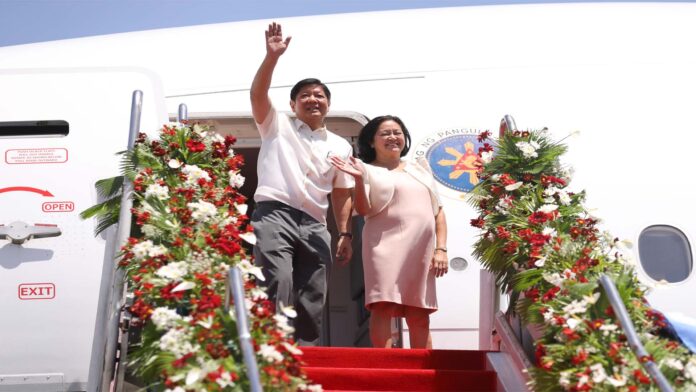President Ferdinand R. Marcos Jr. left Manila on Sunday on a mission to forge stronger ties with the United States for a wide range of areas such as food security, digital economy, energy security, and climate change.
In his departure speech at the Villamor Air Base in Pasay City, the President said his visit to the US, a long-standing ally, would reinforce Manila and Washington’s “already strong bonds” by “bringing our alliance into the 21st century.”
“My visit to the United States, and more especially my meeting with President Joe Biden, is essential to advancing our national interests and strengthening that very important alliance,” he said.
Marcos said his visit builds on the “active exchanges” between the two countries, which include the Chief Executive’s bilateral meeting with Biden in New York last September, the visit to Manila of US Vice President Kamala Harris last November, as well as the numerous visits by senior officials on both sides.
Manila and Washington are expected to bolster partnerships in the semiconductor industry, critical minerals, renewable and clean energy, including nuclear, and infrastructure projects “that will improve our digital and telecommunication systems and facilitate sustainability efforts to address climate change,” Marcos said.
He is also expected to meet with American business leaders to further promote trade and investment opportunities in the Philippines.
In the roundtable meetings, President Marcos will be joined by his economic team as well as key Filipino private sector leaders to explore business opportunities “that would serve to grow our economy even more.”
While in Washington, the President will likewise meet with the Filipino community “who continue to contribute towards the country’s economic prosperity.”
According to a statement by White House Press Secretary Karine Jean-Pierre on April 20, President Biden will reaffirm the US “ironclad commitment to the defense of the Philippines, and the leaders will discuss efforts to strengthen the longstanding US-Philippines alliance. The two leaders will review opportunities to deepen economic cooperation and promote inclusive prosperity, expand our nations’ special people-to-people ties, invest in the clean energy transition and the fight against climate change, and ensure respect for human rights. The two leaders will also discuss regional matters and coordinate on efforts to uphold international law and promote a free and open Indo-Pacific.” (PNA)


